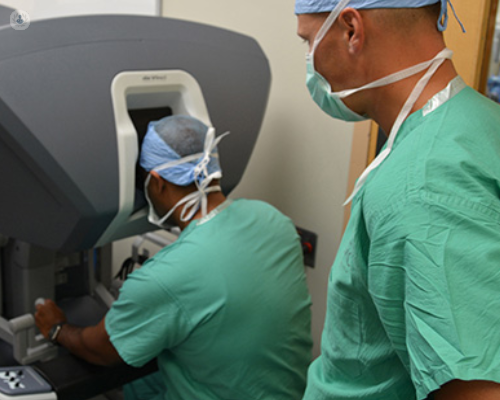All about robotic surgery in urology
Escrito por:Robotic surgery in urology is a rapidly advancing field that offers numerous benefits for patients and surgeons alike. This technology allows for highly precise and minimally invasive procedures, improving outcomes in various urological surgeries, including prostatectomy, nephrectomy and cystectomy.
Leading consultant urological surgeon Mr Ben Challacombe provides a detailed look at this important area of urology.

What is robotic surgery in urology?
Robotic surgery in urology involves the use of robotic systems, such as the da Vinci Surgical System, to assist surgeons in performing complex procedures with enhanced precision. The surgeon controls the robotic arms from a console, which provides a magnified, 3D view of the surgical site. The robot translates the surgeon's hand movements into smaller, more precise actions, allowing for greater control and accuracy.
What are the advantages of robotic surgery in urology?
Robotic surgery offers several advantages over traditional open or laparoscopic surgery, including:
- Minimally invasive: Smaller incisions lead to reduced blood loss, less pain, and faster recovery times.
- Precision: The robotic arms provide enhanced dexterity and precision, which is particularly beneficial in delicate urological procedures.
- Improved outcomes: Patients often experience fewer complications, shorter hospital stays, and better overall outcomes.
What are the common procedures performed with robotic surgery?
In urology, robotic surgery is commonly used for:
- Radical prostatectomy: Removal of the prostate gland in cases of prostate cancer.
- Partial or radical nephrectomy: Removal of part or all of the kidney, typically for kidney cancer.
- Cystectomy: Removal of the bladder, often due to bladder cancer.
Recovery and follow-up care
Recovery after robotic surgery in urology is generally quicker than with traditional surgery. Patients can expect:
- Shorter hospital stays
- Less postoperative pain
- Quicker return to normal activities
Follow-up care is crucial to monitor healing and manage any potential complications. Regular check-ups with your urologist will help ensure a smooth recovery.
Robotic surgery in urology represents a significant advancement in surgical care, offering patients a minimally invasive option with improved precision and outcomes. As technology continues to evolve, the role of robotics in urology is expected to expand, providing even greater benefits for patients.
If you require expert urological surgery, arrange a consultation with Mr Challacombe via his Top Doctors profile.


